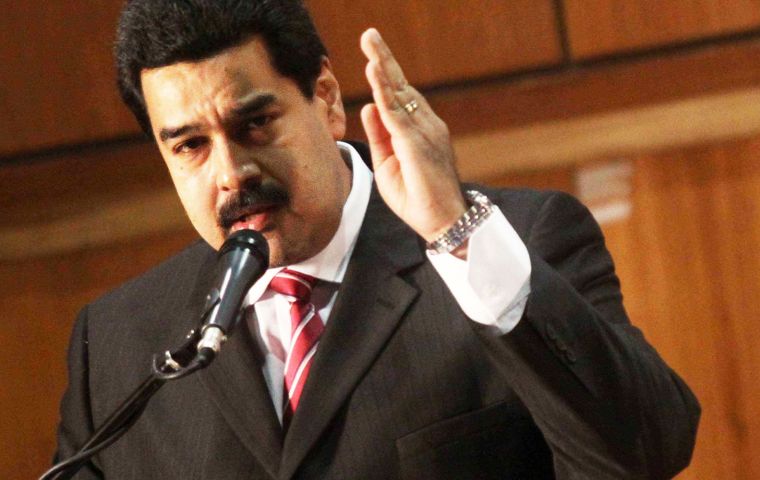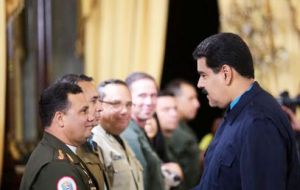MercoPress. South Atlantic News Agency
New York Times warns Obama's strategy towards Venezuela could be failing
 The step could end up backfiring if President Maduro is able to use it to bolster his bogus contention that the United States is trying oust him through a coup.
The step could end up backfiring if President Maduro is able to use it to bolster his bogus contention that the United States is trying oust him through a coup.  Maduro said the sanctions were a badge of honor, and appointed one of the blacklisted officials, Gustavo Enrique González López, as the minister of interior
Maduro said the sanctions were a badge of honor, and appointed one of the blacklisted officials, Gustavo Enrique González López, as the minister of interior In an editorial piece, “A failing relationship with Venezuela”, The New York Times expressed doubts about the latest measures imposed by the Obama administration on seven top officials from the Venezuelan government and goes even further questioning whether they will not end actually reinforcing President Nicolas Maduro position.
The editorial opinion follows:
By imposing sanctions on seven officials in the Venezuelan government on Monday, the Obama administration took a gamble. The move appears intended to signal to members of that government that persecuting the political opposition and limiting an independent press will have consequences.
Yet the step could end up backfiring if President Nicolás Maduro is able to use it to bolster his bogus contention that the United States is trying oust him through a coup.
The sanctions, carried out under a law Congress passed in December, bar the Venezuelan officials from doing business with American citizens and permit the seizure of any assets they have in the United States. It also prevents them from traveling to the United States. American officials, however, seemed uncertain this week of the effect of the measures because it’s unclear whether the blacklisted officials have substantial ties to the United States.
Unsurprisingly, Mr. Maduro called those who were singled out heroes and said that the sanctions were a badge of honor. Acting with characteristic brashness, he appointed one of the blacklisted officials, Gustavo Enrique Gonzalez Lopez, as the minister of interior on Tuesday. Mr. Maduro also asked the National Assembly, which his party controls, for extraordinary powers to face off American “aggression.”
The sanctions were announced days after Mr. Maduro ordered the American Embassy in Caracas, the capital, to cut its staff to 17 from the roughly 100 employees based there now. He warned that his government would limit the activities of the few diplomats that remained, and he also said that American citizens would henceforth need to apply for visas before traveling to Venezuela. Those moves followed the Obama administration’s decision to cancel the visas of 56 Venezuelan officials and some of their relatives, which was meant to punish those suspected of committing human rights abuses and acts of corruption and set an example for others.
While both governments will doubtlessly remain at odds for the foreseeable future, moving closer to a full-scale rupture in relations would harm ordinary Venezuelans who are struggling in an imploding economy, in which inflation is soaring and food shortages are worsening. Venezuela, which exported nearly 26 billion dollars of crude oil to the United States last year, has a lot to lose, but Mr. Maduro appears foolish and recalcitrant enough to want to escalate the conflict.
For now, the showdown stands to provide Mr. Maduro with political cover and excuses amid a widening economic crisis that is largely his fault. To shore up his flagging popular support, he accuses the United States of waging an economic war against his country to drive him out of power.
While American sanctions might hurt some Venezuelan officials, it seems unlikely that they would curb abuses by the government and could even embolden Mr. Maduro. A more productive approach might be to increase efforts to persuade Latin American leaders to speak up for democratic principles in Venezuela and further isolate a leader who is becoming a regional pariah.




Top Comments
Disclaimer & comment rules-

-

-

Read all commentsWith so much resources and leverage the US has, just banning Vzlan oil and PDVSA doing business in the US is enough to make the regime collapse...
Mar 13th, 2015 - 11:35 am 0If you are going to get blamed for anyway you might as well hit them with a hammer.
I'm surprised the U.S. still has a diplomatic mission in Venezuela. The temptation to simply wash their hands of these lunatics must be irresistible. I hope their staff are getting some serious hardship pay.
Mar 13th, 2015 - 12:39 pm 0Agreed, but does the USA want more chaos so close to home? because surely then there would be calls for them to step in...
Mar 13th, 2015 - 12:44 pm 0Damned if they do, damned if they don't.
I think Obama is being quietly cautious and waiting for the Maduro regime to collapse in on itself through internecine fighting.
Meanwhile he can still claim the moral high-ground and 'be seen to be doing something'.
Commenting for this story is now closed.
If you have a Facebook account, become a fan and comment on our Facebook Page!